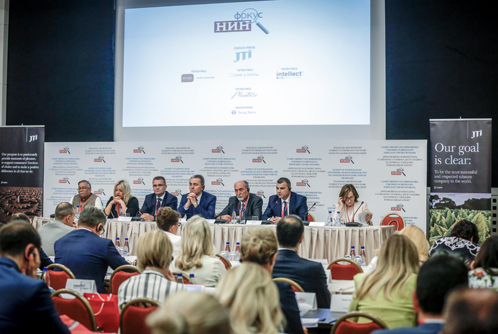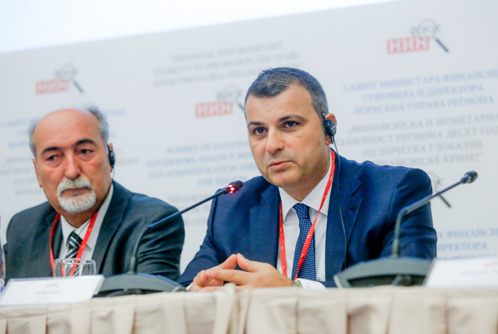BANK OF ALBANIA
PRESS RELEASE
Governor Sejko attends the regional summit on ''Region’s Financial and Monetary Stability Ten Years since the Crisis Outbreak”, Bečići, Montenegro
Publication date: 18.06.2018
On 14-16 June 2018, Governor Sejko attended the annual regional summit in Bečići, Montenegro. This summit was attended by governors of central banks of Montenegro, Macedonia, Bosnia & Herzegovina, Croatia, Kosovo, Serbia, as well as ministers of finance and tax directors from the region.
This year’s summit on “Region’s Financial and Monetary Stability Ten Years since the Crisis Outbreak” addressed the latest developments in the regional economies.

The governors’ panel theme was “Monetary Policy and Stability of the Banking Systems of the Countries in the Region - One Decade after the Lehman Brothers Bankruptcy”.
At the beginning of his speech during the panel, Governor Sejko pointed out that such activities provide an opportunity to share opinions and experiences among central banks. Then Governor Sejko presented one of the most challenging issues that Bank of Albania is experiencing currently, the exchange rate.
He stated that the inflation targeting and the flexible exchange rate regime applicable in Albania have served perfectly well and have helped Albania in its convergence process, providing high economic growth rates, economic and financial stability and the increase and expansion of financial sector. In addition, Governor Sejko emphasised that the flexible exchange rate regime has increased our resilience in absorbing shocks and has reduced their costs. This resilience was recently noted in the episode of the latest global crisis events, where the exchange rate depreciation provided Albania with the possibility to rebalance its external trade and the implementation of an accommodative monetary policy, to boost aggregate demand and minimise costs on Albanian enterprises and households.

Governor Sejko also highlighted that even in free floating exchange rate regimes the monetary policy should consistently and coherently take into account the movements in the exchange rate, for as long as and to the extent these movements affect inflation.
“Short-term exchange rate volatility is normal in a fully flexible exchange rate regime. The reaction of central banks should depend on their impact on inflation, which in itself depends on the intensity and duration of such volatility. The stronger the duration and the higher the intensity of the shocks, the bigger would be the expected impact on inflation, the greater the risk of rapid shifts in inflation expectations, and the higher the need for a systematic reaction of monetary policy.” – Governor Sejko said.
Concluding, Governor Sejko stated that the recent measures undertaken by the Bank of Albania are in full coherence with this philosophy. The increase in the monetary stimulus through the decrease of the policy rate aims at offsetting - in the medium term - the disinflationary pressures stemming from the rapid appreciation of the exchange rate. In parallel, the interventions in the domestic foreign market, aims at reassuring the public on our commitment and ability to comply with the inflation target. Their formatting as measure of last resort, exclusively for the purpose of the price stability objective, and having a temporary application, is in line with our commitment to maintaining a free floating exchange rate regime in both medium and long term.

 Twitter
Twitter
 Youtube
Youtube
 Facebook
Facebook
 Flickr
Flickr
 RSS
RSS
 Subscribe
Subscribe
 Feedback
Feedback